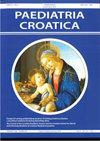儿科肿瘤患者的药物基因分析:单个中心的经验
Q4 Medicine
引用次数: 0
摘要
目的:随着药物基因学研究成果越来越多地应用于临床实践,为癌症患儿提供个性化治疗的最终目标在未来似乎可以实现。我们的调查旨在确定药物基因学在日常工作中的应用程度:方法:我们对萨格勒布儿童医院肿瘤与血液科 2021 年至 2023 年期间接受恶性肿瘤治疗的儿童进行了药物基因检测的回顾性调查:180名儿童中有17.2%(53.3%为女性,中位年龄为7.0岁)进行了药物基因检测,其中2023年的检测次数最多。先期检测包括硫嘌呤S-甲基转移酶多态性检测(94.4%的急性淋巴细胞白血病患儿和33.3%的嗜酸性肉芽肿患儿)和亚甲基四氢叶酸还原酶基因多态性检测(55.6%的急性淋巴细胞白血病患儿和23.1%的骨肉瘤患儿)。8名儿童因不良反应(25%肺损伤和75%肝损伤,均为4级)而进行了药物基因检测,其中大多数病例可能与长春新碱有关。所有反应性检测患者的药物基因检测结果均为病理结果,87.5%的病例需要调整剂量/放弃化疗:结论:由于儿童癌症患者出现严重不良反应而进行的药物基因检测数量一直在持续上升,这将使原本标准化的治疗转向更加个体化的方法。几乎所有计划接受硫嘌呤类药物治疗的患者都已常规接受硫嘌呤甲基转移酶多态性检测。然而,在儿科肿瘤学领域,还需要对药物基因配对进行更多研究,以最大限度地减少治疗相关毒性并优化治疗效果。本文章由计算机程序翻译,如有差异,请以英文原文为准。
Farmakogenetsko profiliranje pedijatrijskih onkoloških bolesnika: iskustvo jednog centra
Aim: As the results of pharmacogenetic studies are increasingly translated into clinical practice, the ultimate goal of personalising treatment for children with cancer seems achievable in the future. Our survey aimed to establish to what extent pharmacogenetics has already been utilised in everyday work.Methods: A retrospective survey on pharmacogenetic testing in children treated for malignancies at the Department of Oncology and Haematology, Children’s Hospital Zagreb, from 2021 to 2023 was carried out.Results: Pharmacogenetic testing was performed in 17.2% of the 180 children (53.3% female, median age 7.0 years), the greatest number of tests obtained in 2023. Preemptive testing included thiopurine S-methyltransferase polymorphisms (in 94.4% of children with acute lymphoblastic leukaemia and 33.3% with eosinophilic granuloma) and methylenetetrahydrofolate reductase gene poly-morphisms assaying (in 55.6% of acute lymphoblastic leukaemia and 23.1% of osteosarcoma patients). In 8 children, pharmacogenetic testing was made due to adverse events (25% lung and 75% liver injury, all grade 4), in the majority of cases presumably related to vincristine. Pharmacogenetic testing results were pathological in all reactively tested patients, requiring dose modification/chemotherapeutics omission in 87.5% of cases.Conclusion: The number of pharmacogenetic assays performed due to high-grade adverse events in children with cancer has been continuously rising, steering otherwise standardised treatment towards a more individualised approach. Preemptive thiopurine Methyltransferase Polymorphism testing has been routinely done in almost all patients planned to receive thiopurines. However, more research is needed on drug-gene pairs in the field of paediatric oncology to minimise treatment-related toxicity and optimise treatment outcomes.
求助全文
通过发布文献求助,成功后即可免费获取论文全文。
去求助
来源期刊

Paediatria Croatica
医学-小儿科
CiteScore
0.20
自引率
0.00%
发文量
0
审稿时长
6-12 weeks
期刊介绍:
In the inaugural 1956 issue of the journal, the editor Dr Feđa Fischer Sartorius outlined the journal''s vision and objectives saying that the journal will publish original papers on the development, pathology, and health care of children from the prenatal period to their final biological, emotional and social maturity. The journal continues this vision by publishing original research articles, clinical and laboratory observations, case reports and reviews of medical progress in pediatrics and child health.
 求助内容:
求助内容: 应助结果提醒方式:
应助结果提醒方式:


